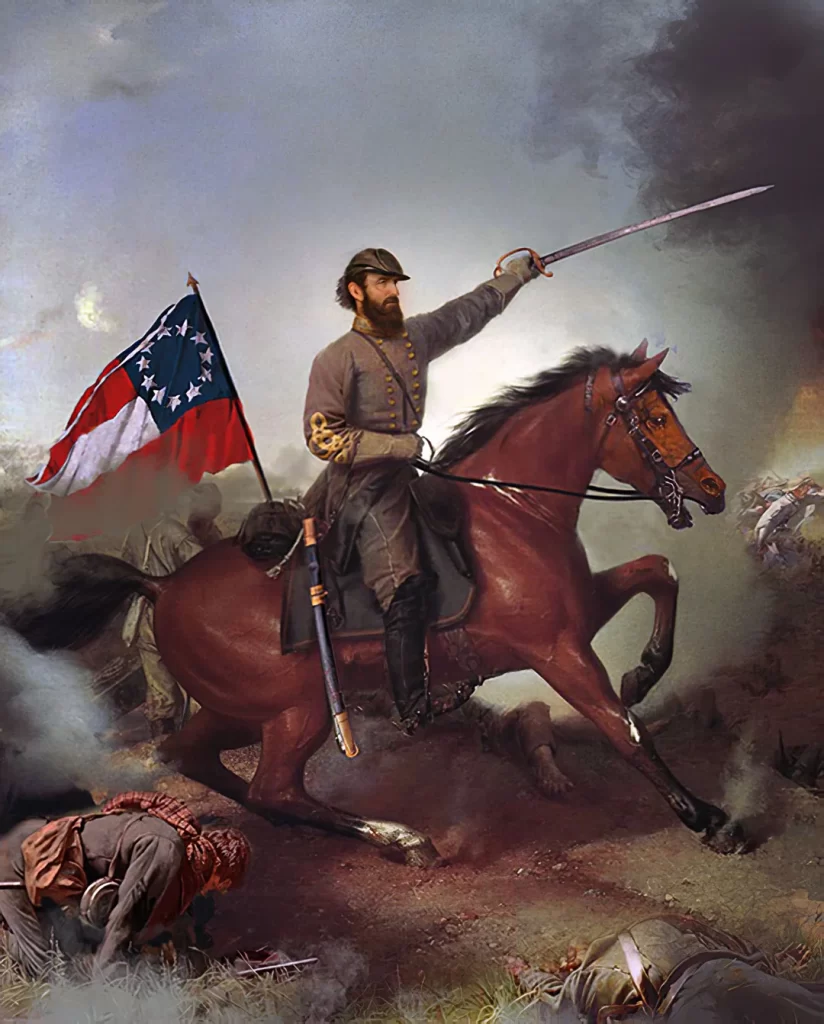The best way to get rid of an aggressor is to keep them from attacking you in the first place. This can be done by making yourself seem more powerful than you really are.
To do this, build up a reputation: Fighting you is more trouble than it is worth. You are a little insane. And to make this impression more credible, pair it with a few impressive – perhaps also violent – acts.
When the opponent does not know what fighting you will cost, they will not want to find out. That is why sometimes uncertainty is better than an overt threat.
Stonewall Jackson did this spectacularly well by playing on the enemy’s natural fears and making them think twice.
Stonewall Jackson Thwarts Lincoln
Less than a year after the start of the American Civil War, around March 1962, the situation of the Confederates was beginning to look bleak. After losing a couple of important battles, the leadership had descended into squabbling, morale was low, and recruits were drying up.
The Union sensed this weakness, and so, an army under Major General George B. McClellan was sent out to march west from the Virginian coast towards the Confederate capital, Richmond. Fortunately, there were enough troops to hold off McClellan for a month or two, but spies were beginning to report that reinforcements from Washington were on the way.
Should they arrive, Richmond would be doomed; and should Richmond fall, so would the Confederacy along with it. With a ragtag rebel army of 3,600, Confederate general Stonewall Jackson was situated in Virginia’s Shenandoah Valley with orders to defend the valley against Union incursions.
Yet he sensed the opportunity to do more than that: he had been a classmate of McClellan’s at West Point, and he knew that under the Union general’s brash, talkative exterior, he was quite timid and scared of making mistakes.
Despite being at the head of a 90,000 strong army, twice as large as the Confederate forces that could be called upon in the vicinity, Jackson could see that he was still waiting for the reinforcements to make his position overwhelming.
Yet, President Lincoln would not release the soldiers if he sensed danger elsewhere. After all, the valley was southwest of the capital, Washington. This presented an opportunity to Jackson; for if he could create a din and confusion elsewhere, he might just be able to disrupt the Union’s plans save the South.
On March 22, Jackson received word that a large majority of the Union troops stationed in Shenandoah Valley were marching east under General Nathaniel Banks to join with McClellan. He also learned that soon an army near Washington under General Irvin McDowell would be headed towards Richmond.
Jackson needed to act fast; he marched out and engaged the Union armies still within the Valley at Kernstown. He was soon forced to retreat, and yet, despite his troops thinking they had merely suffered defeat and terrible casualties, he was strangely pleased.
A few days later he received the news he had been hoping for. Lincoln had caught wind of the action at Kernstown, and, feeling the need to completely secure the Valley, ordered Banks’ army to return. McDowell’s army was also ordered to stay where it was.

The ever-hesitant McClellan was forced to agree with this logic, but despite having the numbers to move on Richmond, he continued to wait for the reinforcements that would make the fall of Richmond a certainty.
For the next few weeks Jackson chose to lay low in the meantime. Soon enough, thinking the Valley pacified, Lincoln had McDowell move south to Richmond, while Banks began preparing to join him.
Jackson again was ready to pounce. Confusing even his soldiers, Jackson bizarrely moved east towards McDowell, the suddenly jerked west into the Valley.
Lincoln quickly decided that McDowell was Jackson’s target. He again halted McDowell’s march, kept half of Banks’ army in the Valley and sent the other half to McDowell’s aid.
Up until now the Union’s plans had seemed so perfect. Indeed, they had been delayed here and there, but they were always in a commanding position.
Now, though, they were dangerously separated. Sure enough, Jackson went in for the kill; on May 24 after linking up with other Confederate divisions, he attacked the Union army in the Valley.
The Union army was sent into headlong retreat and a wave of panic spread all the way to the Washington. The now-dreaded general was heading straight for the capital with a force that had seemingly doubled overnight.
The Secretary of War Edwin Stanton alerted the Northen governors to send troops for the city’s defence. Quickly reinforcements arrived which halted the Confederate advance.
In the meantime, Lincoln had resolved to crush Jackson once and for all. He ordered half of McDowell’s army west to join against the troublemaker while the other half was sent to defend the capital.
Yet again, Jackson went into retreat – but his plan had worked: in twelve weeks he had managed to divert 60,000 Union troops and buy precious time for the South both to defend Richmond, and prepare for a protracted war.
Analysis
These exploits of Stonewall Jackson demonstrates a key principle in warfare that is unfortunately often overlooked.
It is not how strong or weak you are that matters, what really matters is how strong or weak the enemy thinks you are. If they think you are weak and are easy pickings, then they will attack aggressively.
Conversely, if they believe you to be strong and powerful, to be unpredictable, to have resources hidden from view, they will be much more cautious. If you can get the enemy to change their plans by cleverly manipulating their perceptions of you, then you may be able to alter the course of the war.
At the end of the day, you will not be able to control every aspect of the war effort, but there is always the opportunity to change the enemy’s perceptions of you.
Jackson did this first by attacking Kernstown.
This made McClellan and Lincoln believe that he actually had a force much stronger than the rumoured 3,600 – after all, who would be crazy enough to attack a Union stronghold with such small numbers? And since they now thought him to be stronger than he really was, more men were diverted from the Richmond assault to secure the Valley.
Later on, he began to act in an unpredictable fashion. This made Lincoln and McClellan so unsure of his intentions that they split their army to cover all their bases. With a laughably small army, Jackson had somehow created a bogeyman.
You also must learn to play around with perceptions opponents have of you by misleading them, creating appearances, and confusing them. Like Jackson, it is often a good course of action to mix unpredictability and bold action when in a weak, vulnerable position.
This will allow you to take attention away from your shortcomings and lead the enemy to think there may be more to you than meets the eye. In this way, you will keep their aggression off balance since they will be unable to tell how far you are bluffing them.
Sun Tzu put it best in the Art of War: “Appear weak when you are strong, and strong when you are weak.”
Footnotes & Further Reading
Greene, Robert. The 33 Strategies of War. Millionaire, 2006


